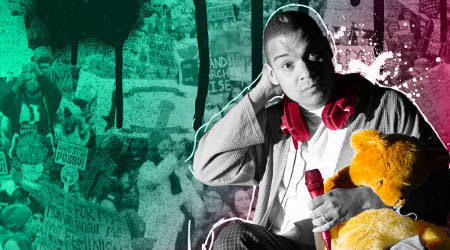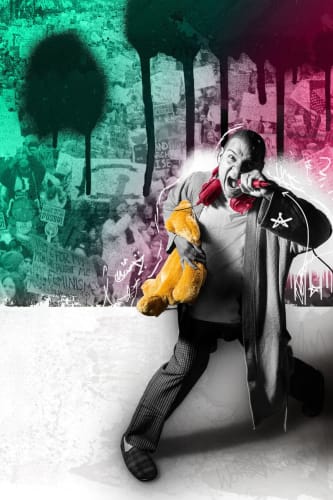Testament stands before us, announcing himself as a “conscious MC”. Or at least, as this 75-minute mix of beatboxing, standup and storytelling demonstrates, that’s what he’s trying to be.
This one-man show is all about the concept of wokeness: the state—or process—of having one’s eyes opened to social justice issues. Hip hop, Testament’s livelihood and lifeblood, has been all about wokeness, back to the civil rights movement and jazz, back ‘before it was an ironic hashtag’, he tells us in a freeflowing mix of narrative, rap, beatboxing and song.
Testament (Andy to his mates) has become a father to a little girl, Elise. She’s a part of the performance, but only as an imagined presence, reminiscent of Simon McBurney’s introduction of his daughter in The Encounter.
And since Elise’s arrival, her father has started becoming more and more alert to another side of hip hop: while many of its creators have been deeply engaged with the struggle for racial and social equality, they have a much worse track record in their treatment of women, whether through the fictions of their music or in the sometimes brutal realities of their lives.
At various points in the show, Testament uses looped samples of his own live beatboxing and singing to weave together hip hop backing tracks over which his lyrics highlight and open up questions of gender inequality. In one of these impressive creations, he takes us through stunning sonic reconstructions of songs from the history of hip hop, through Cyprus Hill and the Sugarhill Gang back to the “Godfather of Soul”, James Brown. On each of these he stops short, goggling at the misogyny and violence of some of these well-loved songs and individuals.
Testament is a one-man mashup machine, generating another remarkable tune from his own live vocal reconstructions of various channel-hopped snippets of TV, from Clueless to Take Me Out to Trump. By holding these disjointed, decontextualized verbal samples out to us, he makes the point that everyday sexism is truly that: sadly everyday. While the performance is skilful and the music infectious, he again cuts it off abruptly at the end with a somewhat on-the-nose observation: “Man, do you ever feel like the world’s really messed up?”
It’s a tactic used often in the production: we watch as the performer stands and thinks, takes something in. He gazes blinkingly at us, sometimes even wiping away a tear. We are, it would seem, witnessing the very awakening of the title.
What we’re really seeing is, rather, an attempt: a perhaps familiar, perhaps flawed, and completely laudable attempt to struggle against decades of ingrained views and behaviour. At one point, Testament uses the analogy of addiction. Societally, and as individuals, many of us are addicted to misogyny. There is no cure—only a series of steps and a constant refusal to sit back and revert to the status quo.
The writing thus segues effortlessly from confession to beatboxing to rap and lyrical song—and to stand-up: Testament engages with the audience easily and has a way with a punchline. Tom Wright’s direction and Emma Adams’s dramaturgy shape the performance to enable this smooth flow from humour to (self-)harangue.
It is fascinating to see Testament on this journey. If there’s a caveat, it’s that the structural inequities we witness him discovering are to some extent mirrored in the form of the show. A well-intentioned conclusion focused around listening to women rather than speaking for (or over) them too easily becomes a vehicle for what is meant as a roof-raising freestyle. The final musical piece also takes women’s voices as starting points for Testament’s creative process rather than as an end in themselves.
At one point “Elise” points out to her father that he’s put together a one-man show, and that she herself has been reduced to a fictional version of a woman, told from a male perspective. Despite the show’s lampshading of such integral ironies, I felt slightly uneasy at the way these structures reinforce the very problem Testament is—clearly deeply sincerely—attempting to square up to.
Hip hop is like a racist uncle, he says. He loves it; it made him what he is. It’s like family. But it’s hard to know what to do to continue in an industry—a form—so responsible for perpetuating toxic norms. Perhaps the first step, as this show suggests, is admitting we’ve got a problem.

